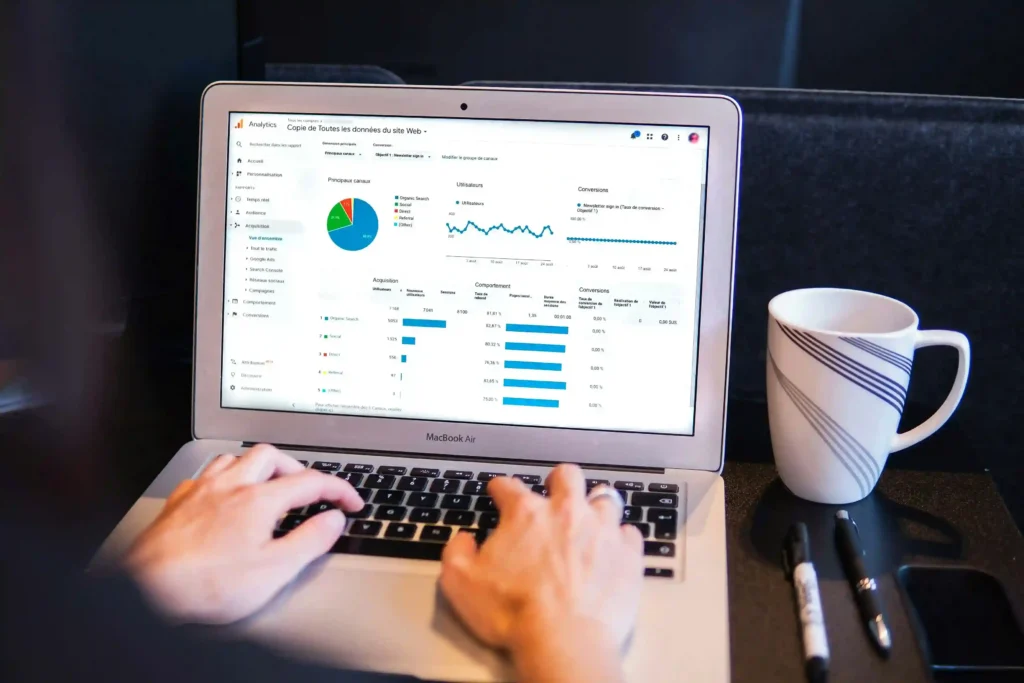Benefits of Data Analytics in Business for Growth and Efficiency
Oktarina
August 15, 2025
12 min read

Ever wondered how you can increase your profits and take your business to the next level? Looking for a way to drive growth and streamline your operations? Data analytics might be the missing piece of the puzzle. In today’s fast-paced, data-driven world, relying on gut feeling or guesswork won’t cut it. Data has become a valuable asset for businesses and the foundation upon which successful companies are built. When used correctly, data analytics can help enterprises to unlock insights, make better decisions, and optimize their operations across all departments. But, what is the benefits of data analytics in business?
In this article, we’ll explore the benefits of data analytics in business, showing how it can fuel growth, guide more intelligent decision making, and overall operational efficiency. You’ll also find practical tips on using data effectively and how data-driven strategies can help your business thrive in today’s competitive landscape. Whether you’re looking to optimize your sales, increase customer satisfaction, or fine-tune your processes, data analytics is the key to achieving your business goals and long-term success.
Benefits of Data Analytics in Business: Why Does It Matters?
At its core data analytics is the process of gathering, examining and interpreting data to uncover insights that can help guide your business decisions. Business analytics is a critical component of modern decision-making, and it uses various tools and techniques to help organisations make sense of their data. Think of it like using a magnifying glass to zoom in on the most critical parts of your business, whether it’s how your customers behave, your operations are running, or what trends are shaping the market. This deeper understanding allows you to see things clearly and make better decisions.
What makes data analytics so powerful is that it doesn’t just show you what’s happened in the past; it also helps you predict what might happen in the future. Descriptive analytics plays a key role by analysing historical or current data to help businesses understand past performance and draw insights that inform future strategies. Using advanced techniques like predictive and prescriptive analytics, you can spot trends before they fully develop and adjust your plan accordingly.
For example, you can understand buying patterns in retail to predict when demand for certain products will spike. In finance, you might use data to forecast cash flow or identify risks before they become problematic. Looking ahead and planning for the future can give you a serious competitive advantage. No matter what industry you’re in, whether it’s retail, finance, healthcare, or e-commerce, understanding your data is key to staying ahead of the competition. It’s no longer just about having data; it’s about knowing how to use it.
By harnessing the right data and analytics, you’re not just reacting to what’s happening in your business; you’re actively shaping its direction. Insights from data and analytics are critical to developing a business strategy. This ability to make data-driven decisions can help you optimise processes, improve customer experiences, and ultimately grow your business.
Benefits of Data Analytics in Business

In today’s competitive business landscape, data analytics is no longer a luxury but necessary for companies that want to thrive. By analysing data from various sources, businesses can unlock a treasure trove of relevant insights that help them make better decisions, improve efficiency, enhance business performance, and drive growth. From understanding customer preferences to predicting future trends, data analytics gives companies the power to identify trends and stay ahead of the curve. Let’s dive into some benefits data analytics can bring to your business.
1. Smarter Decision Making
In the fast-paced world of business, making informed decisions is critical. Data analytics provides the evidence to back up your choices, reducing the risk of relying on assumptions or guesswork. Embracing data-driven decision-making helps organisations reduce uncertainty and gain a competitive edge. Companies can make more intelligent, more effective decisions by analysing customer behaviour, market trends, and operational performance using data analysis techniques such as predictive analytics and artificial intelligence (AI).
For example, retailers can analyze sales data to develop the perfect pricing strategy, ensuring they don’t miss out on sales opportunities while remaining competitive. Similarly, tech companies can analyse user feedback and product usage data to design new products that better meet customer needs, increasing their likelihood of success in the market. Interpreting this data often falls to a data analyst whose expertise supports better decision-making across industries.
2. Better Customer Personalisation
One of the most potent aspects of data analytics is its ability to improve customer relationships. By analysing customer data to understand customer preferences, behaviour, and pain points, businesses can create highly personalised experiences that build loyalty and retention. Take e-commerce giants like Amazon, for example. They use data analytics to track your browsing history, past purchases, customer buying habits, and even what you’ve left in your cart to offer personalised product recommendations tailored just for you.
This level of personalisation improves the customer experience, encourages repeat business, and boosts sales by tracking customer trends to stay ahead of evolving needs. When you understand your customers on a deeper level and use analytics to understand customer behaviour, you can connect with them more meaningfully, making them feel valued and understood.
3. Operational Efficiency
Every business has areas of inefficiency, whether in production, staffing, or supply chain management. Data analytics helps you spot those inefficiencies and take action to improve them. But without proper prioritisation, businesses risk data overload, which can make it difficult to identify actionable insights. Leveraging advanced analytics capabilities in your tools can help streamline processes and improve efficiency.
For example, logistics companies can use real-time data to optimise delivery routes, reducing fuel costs and delivery times. By analysing inventory levels and demand patterns, businesses can improve their inventory management, avoiding overstocking or running out of popular products and ensuring they run smoothly and cost-effectively. When operations run more efficiently, businesses can save money, reduce waste, and improve productivity.
4, Revenue Growth
Predictive analytics is a powerful tool for helping businesses unlock new revenue opportunities. By analysing historical data, multiple data points, and marketing data, businesses can identify patterns, forecast future demand, and adjust their strategies accordingly to spot new opportunities. For example, hotels often use data analytics to predict high and low seasons so they can adjust room prices based on occupancy rates and demand.
This ensures they maximise revenue during peak times while maintaining competitive pricing during slower periods. Similarly, businesses across industries can use predictive analytics to identify potential upsell or cross-sell opportunities and design targeted marketing campaigns informed by analytics, tapping into new revenue streams without adding significant costs.
5. Risk Mitigation
Every business faces risks—fraud, market fluctuations, or customer churn. Data analytics plays a key role in risk management by helping you spot those risks before they become big problems. For example, banks and financial institutions use real-time data analytics to detect fraud as it happens, preventing significant economic losses.
Businesses can also use data analytics, including diagnostic analytics and data discovery techniques to predict and prevent customer churn by identifying patterns in customer behaviour, such as reduced engagement or dissatisfaction. By understanding those warning signs early businesses can take action to retain customers and protect their bottom line.
High data quality is essential for effective risk detection and reliable insights. In short, data analytics enables businesses to manage risks proactively, minimising potential losses and safeguarding long-term success.
Read more: What is Data Analytics and Why It’s Important for Your Business?
How to Use Data Analytics for Business Growth

In today’s data-driven world, data analytics is key to business growth. When used effectively, data can help you make better decisions, streamline operations, and uncover new opportunities. Here’s how you can get the most out of data analytics for your business.
- Set Clear Goals
The first step to using data is to set clear, specific goals. Whether you want to increase sales, improve customer satisfaction, or cut operational costs, having defined objectives helps you focus your analytics efforts. For example, if increasing sales is your goal, you might analyse customer behaviour to optimise pricing or marketing strategies. Clear goals ensure your analytics efforts align with your business priorities and deliver meaningful results. - Collect Good Data
The foundation of good analytics is good data. Get data from reliable sources like your CRM systems, website analytics, or customer feedback. Good data means your insights are trustworthy and actionable. For example, tracking user behaviour on your website can help you understand how visitors interact with your content and improve user experience and conversions. - Choose the Right Tools
Choosing the right tools is essential. Tools like Google Analytics are great for website performance, Tableau for visualising data and creating reports, and Power BI for more advanced business intelligence. Select tools that fit your needs and budget so you get the most out of your data analysis. - Build or Hire Expertise
Data is only as good as the people interpreting it. If you don’t have in-house expertise, consider hiring data analysts or training your team to interpret insights effectively. Hiring a data scientist can be especially valuable as a data scientist is skilled in analysing and modelling data to extract actionable insights. Data scientists develop and implement complex data analysis models, using advanced techniques like predictive modelling and machine learning to extract insights from large datasets. - Scale Strategically
Start small and scale up gradually. Begin by analysing one area of your business, such as customer retention, and expand as you see success. By scaling your efforts strategically, you can implement changes in manageable steps and track progress over time. This ensures your analytics efforts remain focused and effective.
Tips for Using Data Analytics Effectively

To get the most out of data analytics, it’s not just about collecting data. You can turn data into actionable insights that improve your business with the right approach. Here are some practical tips to help you use data analytics.
- Track Relevant Metrics
Start by focusing on the metrics that align with your business goals. Key performance indicators (KPIs) like conversion rates, customer lifetime value, and operational costs provide the most important insights. For example, if you want to increase sales, track conversion rates to see how well your marketing and sales strategies are working. By keeping your focus on the right metrics, you can ensure your analytics efforts support your specific objectives and drive growth. - Verify Data
Good decision-making starts with good data. Regularly clean and validate your data to avoid bad data that can lead to bad decisions. This means checking for duplicates, correcting errors, and removing outdated information. Good data means the insights you get are reliable, so you can make better decisions for your business. - Integrate with Business Systems
For data analytics to be truly effective, it must integrate with other business systems, such as CRM or ERP software. This seamless integration means data flows smoothly across your operations and gives you a clearer picture of your business. It also automates processes so you can make faster decisions and more efficient workflows. - Focus on Actionable Insights
Data analytics is only valuable when it leads to action. Instead of just generating reports, focus on insights that can improve your business. For example, if a product isn’t selling well, use that information to adjust marketing or pricing strategies. Make sure your insights lead to practical steps that can drive real improvement in performance. - Prioritize Data Privacy
With data security concerns growing, customer privacy should be the top priority. Ensure your business complies with data protection regulations like GDPR or Indonesia’s PDP Law. Protecting your customers’ data builds trust and helps you avoid legal and financial risks.
Read more: How Data Analytics Help Business Boost Profitability? Find Out Here!
Grow Your Business with Juara Production!
Data analytics is the key to unlocking your business potential. By tapping into your data, businesses can make better decisions, be more efficient, and stay competitive. With insights from data analytics, you can optimise every aspect of your business from customer engagement to supply chain management. Whether you want to improve marketing campaigns, product offerings or customer loyalty, data analytics can help you do it faster and better. Without data, businesses have to guess. But with data analytics, you have a clear evidence-based path forward.
Need help getting started or want to get more from your existing data? Juara Production is your partner. Our Analytics and Data Services help businesses unlock the full potential of data. We offer customised data analytics solutions for your business. Whether you’re just starting to explore data analytics or looking to take your current strategy to the next level we’re here to guide you through the whole process. Our team works closely with you to understand your goals so the solutions we provide align with your growth vision. You’ll have the tools to make decisions that drive real results with us.
Ready to use data to grow your business? Get in touch today for a consultation. Let’s talk about how data analytics can help you work smarter, scale faster and stay ahead with Juara Production!





